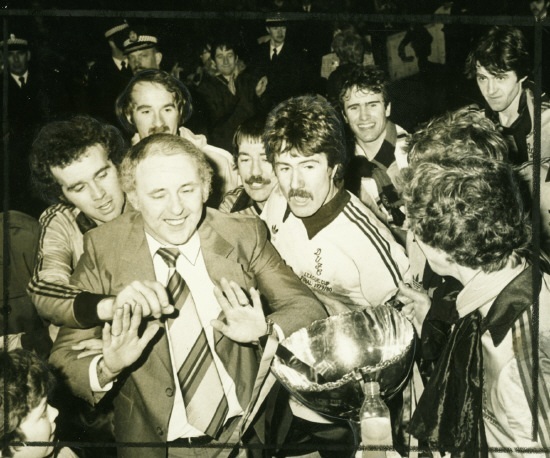With Dundee University preparing to give former Dundee United manager an honorary degree, sports reporter Ian Roache pays tribute to a legend of Scottish football.
As the world watched Barcelona weave their magic in the Champions League final at the weekend, you can bet a few Dundee United fans proudly mentioned their 100% record against the Spanish superstars.
With Barca now widely regarded as the best club team ever to have played football, it seems quite extraordinary a provincial side from Scotland has played them four times and beaten them four times in competitive matches.
Yet United managed home and away successes under Jerry Kerr on their European debut in 1966, and did it again 21 years later.
The Tangerines, on their way to the UEFA Cup final in 1987, met the Catalan side at the quarter-final stage and recorded a 1-0 first-leg win at a packed Tannadice, thanks to Kevin Gallacher’s cross-shot.
They then went to the Nou Camp two weeks later and achieved one of the greatest results ever recorded by a Scottish side in Europe by beating Barcelona 2-1, courtesy of headed goals from John Clark and Iain Ferguson.
Let’s just take a breath here. A club from a wee city by the Tay dumped one of the world’s biggest teams one containing megastars of the time such as Gary Lineker and Mark Hughes out of Europe in their own stadium.
The mastermind was, of course, legendary manager Jim McLean.
The remarkable thing is that it can be can argued that wasn’t McLean’s greatest achievement during his 22 years as boss of United, whom he joined in 1971 from neighbours Dundee, where the former Dark Blues player had been first-team coach.
There are plenty of other candidates.
He led United to their first national trophy, beating Aberdeen 3-0 in the League Cup final replay at Dens Park in 1979.
Along came another League Cup to be lifted by skipper Paul Hegarty a year later, this time conquering Dundee on their own park on a proud day for the city as it hosted a national final for the first time.
McLean had secured his place in Scottish football folklore by then, but in 1983 he guided his players to what this writer considers the greatest achievement of all the Premier Division championship.
Celtic, Rangers and an Aberdeen side that had just lifted the European Cup Winners’ Cup all had to look on with envy as a 2-1 win over Dundee again at Dens meant the flag would fly over Tannadice for the first time.
With typical McLean style, the triumphant United players turned out against Forfar in a testimonial match the next day!
The domestic silverware was accompanied by European results which, were they to happen now, would scarcely be believed.
French aristocrats Monaco seen off 5-2 in Monte Carlo; German aces Borussia Monchengladbach thumped 5-0 at Tannadice to overcome a 2-0 first-leg deficit; a thrilling 2-2 draw at Old Trafford against a star-studded Manchester United team; Belgian champions Standard Liege hammered 4-0; when United outplayed Italian champions Roma at home in the European Cup semi-final, winning 2-0 before losing the return 3-0 in contentious circumstances; and the run to the UEFA Cup final that included the Barca victories and ended in glorious defeat to Gothenburg in the second leg of the decider on their own pitch.
Under McLean, several United players earned international honours, culminating in Scotland’s 1986 World Cup finals squad that included Dave Narey, Paul Sturrock, Eamonn Bannon, Maurice Malpas and Richard Gough, with McLean heading to Mexico as Alex Ferguson’s assistant manager. A photograph of that group still has pride of place in the reception area of the stadium.
All was not rosy during the McLean years, though, with United’s inability to collect the Scottish Cup despite numerous trips to Hampden a frustration for everyone connected with the club.
His time in the boardroom did not bring the highs of the dugout days, although he was chairman when United finally lifted the Scottish Cup in 1994 under the management of Ivan Golac.
There was the infamous incident involving BBC TV reporter John Barnes and the often difficult relationship with the man who bought his stake in the club, the late Eddie Thompson.
But he and his players did bring fame and respect to his adoptive home, and the joiner from Larkhall has been a welcome addition to the list of proud Dundonians.
McLean enjoyed “jousting with giants” so much it was the name of his autobiography.
When it comes to United, the city and Scottish football in general, the wee man is a giant himself.
